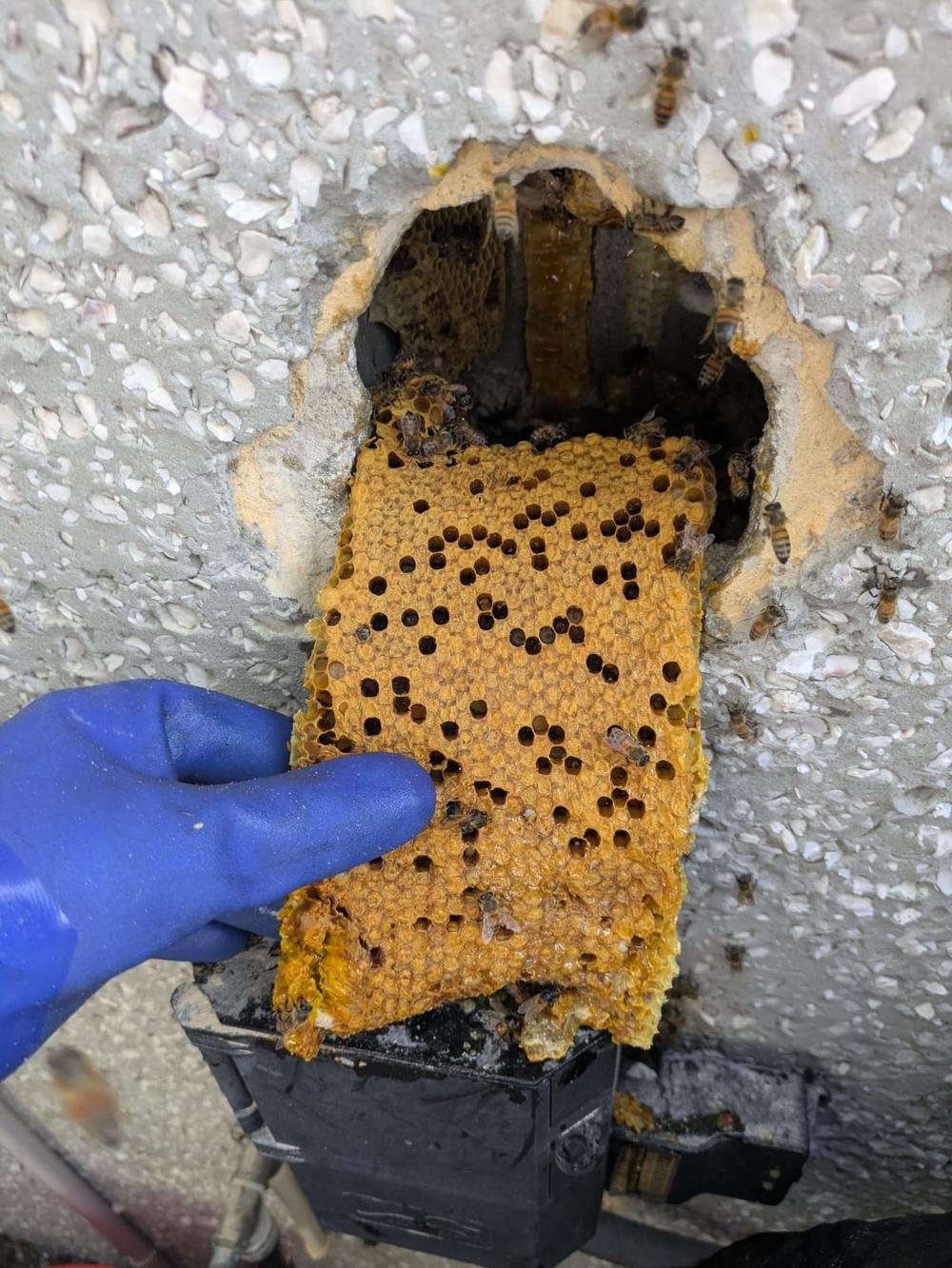How to Safely Remove Bees from Concrete Block Walls in Florida!
Bees are vital to our ecosystem, but when they decide to build a hive inside your home’s concrete block wall, they can pose a serious challenge. In Florida, with its warm weather and long blooming seasons, bee infestations are more common than many homeowners realize. Whether you live in Boca Raton, Orlando, Miami, or Tampa, chances are you or someone you know has faced bees nesting in unusual places.
Concrete block walls—due to their hollow centers—provide the perfect sheltered environment for bees, especially honey bees. If you suspect a bee infestation inside your walls, it’s crucial to act quickly and safely. This blog examines why bees prefer concrete block walls, the risks associated with DIY removal, and how Eco Bee Removal offers eco-friendly solutions throughout Florida.
Why Do Bees Nest Inside Concrete Block Walls?
Concrete block walls have internal cavities that mimic the kind of protected space bees naturally seek out in trees or rock crevices. These voids protect the hive from weather, predators, and human interference. Florida's high bee population and extended flowering seasons only add to the frequency of such infestations.
Bee Removal in Florida Concrete Wall.
Common entry points include:
Weep holes
Cracks in mortar joints
Utility openings
Gaps around windows or vents
Once bees enter, they quickly start building combs inside the wall voids. A queen bee can lay thousands of eggs, rapidly expanding the colony.
Signs You Have Bees in Your Concrete Wall
Bees inside walls may initially go unnoticed. However, over time, you might notice:
Buzzing sounds are coming from the wall
Bees flying in and out of a specific spot
Dark stains on the walls due to the melting honey
Warmer wall sections (from hive activity)
These signs are particularly common in older homes or buildings with unsealed gaps and cracks.
Dangers of Ignoring or Mishandling a Wall Bee Infestation.
Structural Damage: Honey can seep into insulation and wood, leading to mold growth and attracting pests like ants or rodents.
Aggressive Behavior: Disturbed bees may become defensive and sting anyone nearby—especially dangerous for children, pets, or people with allergies.
Recurrence: Even after the bees leave, residual pheromones in the wall can attract new swarms.
Attempting DIY removal often makes the problem worse. Sprays or insecticides can kill some bees but leave the hive structure behind, which will rot and attract more pests.
Why You Should Choose Professional Bee Removal Services
Removing a bee colony from a concrete wall is a delicate process. It requires:
Experience identifying hive locations
Tools to access the wall without causing excessive damage
Techniques to preserve and relocate the bees
Proper sealing and repair of the entry point
At Eco Bee Removal, we specialize in live bee rescue using environmentally safe methods. We don’t kill the bees—we safely remove and relocate them to preserve their ecological role.
Our Concrete Wall Bee Removal Process:
Whether you're in a coastal city or an inland town, our removal methods stay consistent and effective. We begin with a thorough inspection using sound tools and thermal imaging to identify the exact hive location hidden within the concrete wall. Once identified, we open a small section carefully—avoiding unnecessary damage—and use gentle methods to remove the bees alive. After relocation, we remove all hive remnants, including combs, wax, and honey, ensuring no lingering scent draws new bees in. Finally, we repair and seal the entry point so your wall is as good as new.
Our bee removal services stretch across the Sunshine State 🌞. From the bustling neighborhoods of 🌆 Miami and 🏙 Orlando to the breezy coasts of 🏔️ Cape Coral and Ft. Myers Beach, we bring expert care to every corner. We’ve safely removed bees from homes and businesses in places like 🏠 Boca Raton, 🏓 Tampa, and 🌳 Gainesville, as well as vibrant communities such as Coral Springs, Hollywood, Daytona, and Sarasota. Our team is also active in Jacksonville, Lake Worth, Ft. Pierce, Titusville, West Palm Beach, and even the historic streets of St. Augustine — offering trusted service wherever bees may appear.
Honeycomb Inside Concrete Wall—Florida Bee Hive.
What Sets Eco Bee Removal Apart?
Fully licensed and insured
Experienced technicians
Eco-friendly practices
Emergency response options
Affordable and transparent pricing
Commitment to bee conservation
We don’t just remove bees—we protect your home and the environment.
Frequently Asked Questions (FAQ)
Q: Will the bees come back after removal?
A: Not if the hive and all pheromones are fully cleaned and the entry points sealed, which we always ensure.
Q: How long does the removal process take?
A: Most removals are completed within 1-3 hours, depending on the size of the hive and wall access.
Q: Do you handle emergency bee removals?
A: Yes, we offer emergency services in most of our service areas.
Call Us for Safe Bee Removal in Your Florida City
If you suspect bees in your concrete block wall, don’t delay. The problem won’t go away on its own. With our eco-conscious approach and fast response, Eco Bee Removal is your trusted partner in keeping your home safe and bees alive.
📞 Call Now: (352) 460-9854
🔗 Contact Online: https://www.ecobeeremoval.com/contact-us


